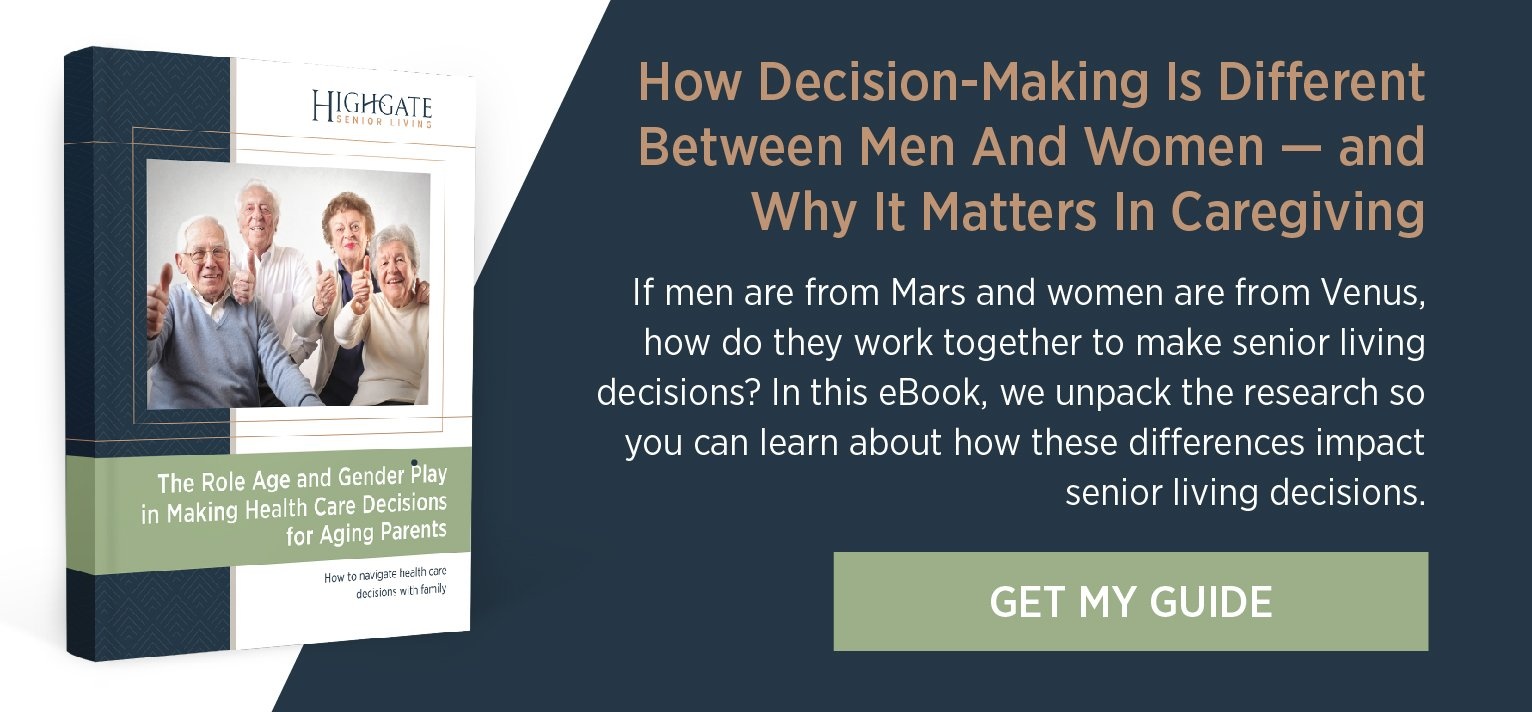
There are some decisions that you’ll make with your aging parent that are relatively easy: Chicken or fish for dinner? There are others that, for a variety of reasons, will be harder.
Just like family dynamics can play a role in how a family approaches decisions, so can age differences.
How Our Decisions Change with Age
The way you make decisions changes at every stage of life. As you age, you gain life experiences that guide how you make decisions. You might call this wisdom. You also may have a deeper understanding of life through research and what you’ve learned from others — aka knowledge. You might face changes in short- and long-term memory that affect how you look at and process difficult decisions, or you may have a difficult time with a decision you made that affects how you look at other similar decisions later on in life.
These combinations of gains and losses can lead older people to use different strategies in decision-making than those younger than them. Specifically, what motivates an individual to make difficult decisions changes for older adults. With age, people shift from being motivated by promotion and growth toward being motivated by maintenance and loss prevention.
Here’s a closer look at how older people make decisions and how to apply it to health care decisions.
How Older People Make Decisions
An angry outburst when bringing up the idea of providing more support to a parent or a shocked look of disbelief when you tell Dad that you think it’s time to get Mom more help may cause you to think that older people are driven more by their emotions than you. This can lead some to believe that the older you get, the more likely you are to be irrational.
The truth is that although you may view making this kind of decision as urgent and important, your loved one may not. Older adults are less likely than their younger counterparts to engage in decision-making in the first place and often bypass the entire process through choice delegation, deferral, or avoidance.
Once engaged with a decision, older adults tend to be less exhaustive in their research than middle-aged or young adults. Most prefer to choose among fewer options and review fewer pieces of information, and often, decisions are made more quickly.
Older adults are more likely to use strategies such as satisficing (choosing the first alternative that meets a given standard). This is partly because the older you get, the more likely you are to prefer personally relevant information. Older adults tend to draw more on their prior experiences and emotional responses than their younger counterparts. To some, this may cause concern that an older adult has become set in their ways, but understanding this shift in decision-making logic can help you identify ways to approach conversations with an aging loved one successfully.
How to Apply This to Health Care Decisions
1. Make information personally relevant.
When starting the conversation with an aging loved one about care, caregiving, or senior living, talk about family or friends who have encountered their own difficult situations and who didn’t have a plan in place.
You might say something like: “Mom, I was thinking about what happened to Karen, and it made me realize we never talk about these things. I don’t want to pry, but it would give me peace of mind to know there’s a plan if we need it.” Or you could also focus on what has changed: “Dad, do you remember how active you and Mom used to be with church or your cribbage club?”
2. Narrow down options.
Before sharing brochures from every home care agency, day program, or senior living community in your area, thoroughly research and check on multiple options or communities to help pick the two or three that might be the best fit. Then present your parent with some options.
3. Be patient.
Give your aging loved one time to reflect on their current situation, how their health or happiness may change in the coming years, and the information they’ve received from you. Tours of prospective communities or day programs might be a great way to give your loved one time to process.
Unless you consider your loved one’s need to be an emergency, try not to push. It’s hard to wait, but you will likely need to take more time to work through the process than you’d like, so being proactive is key.
If you want to broach the subject again, try waiting for an opportunity to offer an alternative living arrangement, a day program, home care, or assisted living as a solution to a problem your parent has brought to you. For example, you might wait to say anything further until a very lonely day when Dad is bored and complaining about how he never sees his friends anymore to talk about all of the activities and opportunities he would have in a community setting.
4. Help them feel in control.
Do your best to make your aging parent feel they are in control of their life and this decision — because they are. For example, you might say something like: “Mom, I want what’s best for you, but I also respect that it’s your decision. Do you mind if I share my thoughts with you and we can talk about possible solutions together?”
How to Navigate Health Care Decisions with Family
Caregivers sometimes struggle to find resources and successfully navigate the health care maze. Mistakes in care and decision-making can occur when caregivers are time-pressured. Mental and emotional stress can result in unintentionally poor decision-making. Caregivers make decisions in crisis situations and then regret making uninformed choices that don’t turn out as expected.
You gain confidence in decision-making and planning for the care of elderly parents through experienced caregiving experts. For example, did you know that gender differences can play a huge part in how we make decisions, too?
So whether you’re deciding to buy a house with an in-law suite or to move Mom, Dad, or a spouse into a senior living community, understanding these differences can help you understand why your brother might all of a sudden want to be very hands on with care decisions about your mom or why your father might ask you to give him one more year living at home.
To learn more, download our eBook The Role Age and Gender Play in Making Health Care Decisions for Aging Parents.






